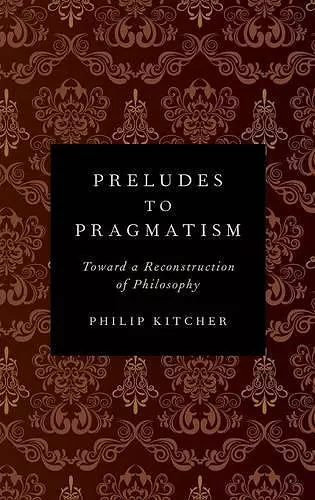Preludes to Pragmatism
Toward a Reconstruction of Philosophy
Format:Hardback
Publisher:Oxford University Press Inc
Published:29th Nov '12
Currently unavailable, and unfortunately no date known when it will be back

Over the last two decades the distinguished philosopher Philip Kitcher has started to make a serious case for pragmatism as the source of a new life in contemporary philosophy. There are some, like Kitcher, who view today's analytic philosophy as mired in narrowly focused, technical disputes of little interest to the wider world. What is the future of philosophy, and what would it look like? While Classical Pragmatism -- the American philosophy developed by John Dewey, Charles Peirce, and William James in the 19th century-- has a mixed reputation today, Kitcher admires the way its core ideas provide a way to prioritize avenues of inquiry. As he points out, both James and Dewey shared a wish to eliminate 'insignificant questions' from philosophy, and both harbored suspicion of 'timeless' philosophical problems handed down generation after generation. Rather, they saw philosophy as inherently embedded in its time, grappling with pressing issues in religion, social life, art, politics, and education. Kitcher has become increasingly moved by this reformist approach to philosophy, and the published essays included here, alongside a detailed introduction setting out Kitcher's views, provide motivation for his view of the "reconstruction of philosophy." These essays try to install the pragmatic spirit into contemporary philosophy, renewing James and Dewey for our own times.
Preludes to Pragmatism is an important and rewarding book. * Christopher Hookway, Notre Dame Philosophical Reviews *
In this lively and lucid collection of essays, Philip Kitcher--one of America's leading philosophers--seeks to further the reform of philosophy inspired by the pragmatic tradition of James and Dewey. Critical of the current state of Anglophone philosophy, he develops a pragmatic naturalism that deals with some of the most pressing cultural issues of our time-including the meaning of value in contemporary society and the reconciliation of science and religion. Anyone interested in the creative potential of pragmatism for the reconstruction of philosophy today will find this insightful book invaluable. * Richard J. Bernstein, Vera List Professor of Philosophy, New School for Social Research *
In articles ranging from metaphysics and philosophy of mathematics to ethics and the philosophy of religion, Preludes to Pragmatism develops and makes a powerful case for pragmatic naturalism. By drawing on, extending, and emending ideas drawn from the classical pragmatists, Philip Kitcher argues that no appeal to transcendent, non-natural entities is required to underwrite our deepest theoretical commitments, or rationalize our practices. * Catherine Z. Elgin, Harvard University *
Philip Kitcher's Preludes to Pragmatism offers a radical 'reconstruction of philosophy' which aims to renew the projects of William James and John Dewey. Advocating a form of 'pragmatic naturalism,' Kitcher's aim is not simply to use pragmatist ideas as material for a more sophisticated reformed 'normal philosophy.' Rather than using pragmatist ideas to provide better solutions to familiar problems, he follows Dewey in seeking to 'liberate philosophy' from familiar questions that can now be transcended. Whether discussing atheism or secularism, race or altruism, he meets familiar views with pragmatist challenges that can change the philosophical terrain. In doing so, he contributes to the truth of his claim that pragmatism is one of the most significant developments in the history of philosophy. * Christopher Hookway, University of Sheffield *
ISBN: 9780199899555
Dimensions: 236mm x 160mm x 46mm
Weight: 658g
464 pages